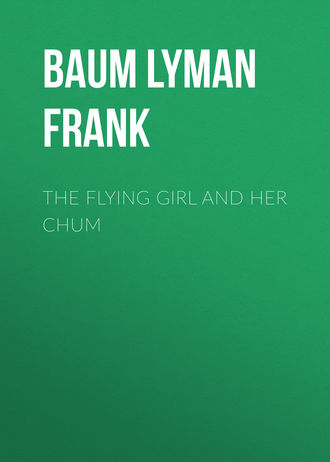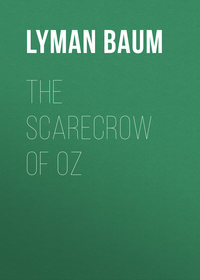 полная версия
полная версияThe Flying Girl and Her Chum
But Francisco failed to put in an appearance, to his master's great annoyance. That old tub of a launch was precious to him, for if all else failed he must use it to make good his escape. Also he needed the three men to assist in boarding the yacht in the night attack. His men were unarmed, while the yacht's crew seemed well provided with weapons of defense.
As the day wore on he considered sending the rowboat to search for Francisco's party, but decided not to risk it. Of course Francisco would come, in time; doubtless he was delayed because he experienced difficulty in capturing his man.
Evening came, but no Francisco. Ramon Ganza was perplexed; he was even somewhat troubled. He must defer the attack until the launch arrived, for he intended to use it to carry his men to the side of the yacht. His plan was to have the launch run up to one side and make a noisy attack, to create a diversion and concentrate the attention of those on board, while he and a party of picked men stole silently to the other side in the rowboat, climbed to the deck and overcame all who opposed them. The bow was too high to scale, where it rested on the beach; the attack must be made near the stern, which sat low in the water.
Therefore the launch was quite necessary, as were the three men who were absent with it, so Ramon was angry with Francisco for not returning more promptly.
The outlaw paced up and down the rocks in the starlight and cursed his dilatory lieutenant most heartily.
But the launch was coming. In fact, two launches were coming to the bay.
As soon as night had really settled down, Mr. Radley-Todd quit loafing and suddenly became active. He carried his trussed and helpless prisoners, one by one, to the small launch and laid them gently along the bottom. He had already, during the afternoon, waded out to the larger launch of Ganza, bored a large hole in its bottom and then stopped the inrushing water with a plug. He chuckled while doing this, being greatly pleased by what he called his "foxy plan to fool the pirate."
With his prisoners aboard, the boy shoved the Salvador's launch into the water and cautiously paddled it between the rocks and to the side of the big launch, to which he attached it by means of a rope.
"I think I shall gag you boys, as you suggested," he said to the prisoners, who by this time had become sullen and decidedly unfriendly.
"No!" cried Francisco, partly in anger and partly in fear; "it is not necessary. We know what to do."
"Will you promise not to cry out and attract Ramon's attention?"
"We swear it!" they all cried eagerly.
"Then I think I shall gag you. Not because I doubt your word but because I've whittled out three lovely gags and I'm anxious to see how they work."
They began to protest vigorously at such unkind treatment, but Chesty gagged them, by turns, and they were effectually silenced.
"You boys are splendid actors," he told them, admiringly, "and you are performing your parts with great credit to us all. No one would guess this was your plan, would he? Ramon least of all. If we are not captured, you will make an important addition to our party on the yacht. If we are, you will lie gloriously to Ramon and say I sneaked up behind you and sandbagged all three before you saw me. Eh? Never mind answering, for you can't."
As he spoke, Chesty climbed into the big launch and started the engines. They grumbled and refused to act, at first, but finally overcame their reluctance and the boat chug-chugged on its way to the south bay, making such a racket that the owls thought it was defying them and redoubled their frantic screeches.
"Ramon will be certain to hear me coming," reflected the boy as the boat swept on. "He's a clever scoundrel, that Mexican; exceptionally clever; but if he guesses this riddle he's a wizard."
He kept the launch well out from the shore and as it approached the points of rock behind which the yacht lay hidden he set the steering wheel to carry the boat a couple of hundred yards past the entrance to the bay, lashing it firmly in place. Then, while the engines continued their monotonous "chug-chug," he pried the plug out of the bottom of the boat, crept aboard the Salvador's launch and unfastened the rope, cutting the two craft apart. The big launch quickly forged ahead and Chesty sat down and let the smaller boat drift peacefully where it lay.
Ramon Ganza had heard his boat coming, as Chesty had intended he should. Greatly relieved, but still angry with Francisco, he ran as far out upon the point as the rocks would permit and peered through the starlight to catch sight of the approaching launch.
Presently it appeared, making good time, the old engines working steadily and doing their full duty. But it did not turn into the bay, for some extraordinary reason; instead, it kept straight on and headed for some indefinite point out at sea.
"Francisco!" shouted Ganza, in a rage; "Francisco – villain – fool! What are you doing? Wake up, Francisco! The idiot is asleep."
As the precious launch did not halt, the outlaw ran along the shore, following its track and shaking his fist at the perverse Francisco with vengeful energy. Most of his men, attracted by their chief's excitement, left their posts to join him on the shore; the others gazed wonderingly in the direction of the disappearing launch.
Meantime, Chesty Todd cautiously paddled his little boat into the bay, crept to the side of the yacht and uttered a low whistle – the signal agreed upon. Those on board, who had been interested in Ramon's shouts and suspected something was about to happen, lost no time in lowering the davits and Chesty promptly attached the grappling hooks. A few moments later the launch and its occupants were safely on deck and the boy stepped out to be greeted by hearty handshakes and congratulations on his safe return.
"You'll find three prisoners in the launch, Captain Krell," he said. "When you remove their gags they'll protest they are our friends; but I wouldn't trust 'em. Better lock 'em in the cage until this cruel war is over."
"What has become of the Mexican's launch?" asked Mr. Cumberford. "The pirates seem to be having some trouble over it."
"It won't bother 'em for long," replied Mr. Todd, complacently. "The boat is headed out to sea, all by its lonesome; but there's a hole in the bottom and it's fast filling with salt water. I imagine that within the next fifteen minutes it will go to Davy Jones's locker, and be out of commission."
CHAPTER XXVI
ORISSA RETURNS
If ever man was thoroughly perplexed it was Ramon Ganza the outlaw. He heard his launch proceed for a distance out to sea, then listened while the engines hesitated and stopped, and saw the boat on which his liberty might depend whirl slowly around and disappear beneath the waves. What could it mean? Were his men on board, and had they met with some astonishing accident, or had they deliberately committed suicide? The curses died on his lips; the affair was too startling and too serious for mere raving; he must try to think of a logical solution of the problem.
The loss of the launch, his last refuge from captivity and imprisonment, left him caught like a wolf in a trap – in case he failed to get possession of the yacht. All night long he sat on a rock by the sea, smoking his black cheroots and thinking – thinking – thinking. Neither he nor his men knew that Chesty Todd had returned to the yacht; but if Ramon had known it he would not have attached especial importance to the fact. It would merely mean one more person to capture during the assault.
Morning found Ganza still deep in thought. He glanced rather uneasily at the ocean and at times swept the horizon with his glasses, which were slung by a strap to his shoulder. His men brought him food and a cup of hot coffee, but dared not speak to him in his present mood. They suspected his case was growing desperate, yet they still retained confidence in their resourceful, clever master, who had never yet failed to accomplish whatever he undertook.
In this crisis of his career the fugitive, usually irritable and quick to act, proved his strength of mind by taking time to consider his position from all points and to weigh carefully the merits of the different plans that suggested themselves. He realized that an error at this time would prove fatal.
The hours wore on until, at about the middle of the afternoon, as Ganza made one of his periodic inspections of the horizon, his glasses caught a speck in the sky – a speck that moved and grew larger. At first he thought it a gull or an eagle; later he changed his mind, for the speck rapidly increased in size and took form, and the form was that of an aëroplane.
Those on the yacht saw it now and great was the wonder and excitement it caused. Here was a messenger from the great world, bringing them hope of succor or black disappointment. Presently the broad spreading planes bore down upon the island and circled gracefully over the ship.
"It's Orissa!" they cried in chorus and Chesty Todd added: "She wants to land on deck. Clear a space – quick!"
They did the best they could. It seemed like a tiny place for that great sweeping thing to land on and even Sybil exclaimed: "She'll never make it in the world!" But Orissa, hovering above them in her Aircraft, observed carefully the conditions below and shutting off her engine began to volplane.
The huge machine settled quietly down and alighted fairly upon the deck. One rail caught the lower plane and tipped it, but the girl leaped lightly from her seat and was caught by Mr. Cumberford, whose gray eyes sparkled with joy from behind their spectacles.
You may be sure the brave girl received a glad welcome, but as soon as her safety was assured she was deluged with questions. The ping of a rifle ball warned them to scuttle below to the cabin, where Orissa tried to explain.
"Why on earth did you venture to come back?" demanded Madeline. "We had told ourselves that you, at least, were safe from the dangers that menace us, and it pleased us to know that. But where is your brother?"
"Did you get to land?" cried half a dozen voices, eagerly. "What did you do? Tell us!"
Orissa laughed and held up both hands, imploring silence.
"I came to bring you good news," she began. "And now that you are assured of that, please let me tell the story my own way, or I shall bungle it."
"Go ahead," they answered and settled themselves to listen.
"We followed the route Captain Krell had mapped out for us," said Orissa, "and in four hours after leaving here we sighted the Mexican coast. Fifteen minutes' run to the north brought us to the village of San Blas, where there is a telegraph office. We landed and had some difficulty in satisfying the authorities that we were harmless Americans, but finally they agreed to escort us to the telegraph office under guard. We wired our story direct to President Madero, putting it as briefly as possible and asking him for a warship to rescue our friends and capture Ramon Ganza. There was no answer until evening, when we received a message from the Secretary of the Navy saying he had conferred with the President and Secretary of State and would be glad to accede to our request. In eight or ten days he thought he could spare a warship to go to the island for Ganza. Unfortunately, the entire navy was in use at the present time.
"That dashed our hopes, you may be sure, for we feared you couldn't hold Ganza at bay for so long; so Steve and I determined to fly to San Diego and secure help there. The Secretary of the Navy had wired the authorities of San Blas to afford us every consideration and hospitality, so we filled our tanks with gasoline and slept at a little inn until daybreak. Then we were off for the north, and in two hours met the United States torpedo fleet, on its way to Magdalena Bay for target practice. We made out the flagship and dropped to the water beside it. Commodore Davis at once laid to and sent a boat to us. Steve went aboard and explained fully to the commodore our story and the need for immediate help. As a result the Mermaid was signaled and its captain presently came aboard and received his orders. He was to take us directly to this island, drive off Ganza or fight him, as circumstances might require, and then assist in getting the Salvador afloat again. If he captures Ganza he is to carry him away a prisoner and turn him and his men over to the Mexican authorities at Magdalena.
"Captain Swanson undertook the adventure gladly and is now on his way here with the Mermaid, with Steve to guide him. My brother and I thought it best for me to come on ahead and tell you the good news, for we have worried about you and knew that with rescue at hand you would have courage to hold out, no matter how desperate your condition. So here I am, and the Mermaid will arrive either to-night or early in the morning."
They were indeed delighted with this assurance and it put new heart into the most timorous of those aboard.
"However," said Chesty Todd, "we seem to be in no danger, just now, and since our clever enemy has failed to scare us into surrender he has remained quiet and behaved himself as well as could be expected."
They told Orissa all that had transpired in her absence and the conversation continued all during the dinner – on which the chef exercised his best talents, in honor of Orissa's return – and even until bedtime, there was so much to say.
Chesty went on watch at eleven o'clock, and as he leaned silently over the rail at a point near the bow of the launch he detected a series of queer sounds coming from below. This part of the yacht was high on the shelving beach and it was here that they had arranged huge piles of rock, on either side, to hold the keel level. It sounded to Mr. Todd as if some one was at work near these rocks, for on account of the swell of the boat's side it was impossible to see, from the deck, anyone below, in case he kept close to the keel.
So Chesty crept aft, held a whispered conversation with Captain Krell, and quickly divested himself of his clothing. At the stern, which was settled quite close to the surface of the water, the boy let himself down by means of a rope, descending hand under hand, and silently dropped into the dark water. Swimming was one of Radley-Todd's principal accomplishments and he scarcely made a ripple as he crept alongside the boat until the bow came into full view. The night was somewhat darker than usual, but the American had sharp eyes and it did not take him long to discover that the besiegers were employed in removing the rocks from the right hand side of the keel.
Instantly comprehending their purpose in this, Chesty turned and quickly regained the stern, climbing to the deck. His report to Captain Krell seemed so serious, because it meant a desperate attack presently, that it was promptly decided to arouse the entire party and warn them that a crisis was at hand.
CHAPTER XXVII
FACING THE CRISIS
Consternation reigned in the cabin when the principals assembled there with white and startled faces. On deck Captain Krell was instructing his men how to act in the threatened emergency. Pietro was among them, accepting his rifle and his instructions willingly, but shaking his head at what he considered a vain attempt to resist Ramon Ganza.
"Ramon great man!" he said to Captain Krell. "Ramon always win; nobody can conquer him. I knew Ramon would win this time, an' when he does he will capture me an' whip me hard. All right; I know I am to be whipped at the time Chica tell me to leave Ramon. Never min'. Pietro can stand it, for others have been whipped by Ramon an' lived – with marks like a zebra's on their skins."
In the cabin Chesty was trying to explain the situation.
"It's this way," he said; "when the rocks are all removed the yacht will fall over on her side, as she was at first, with the rail quite near to the water. You remember how she lay before we propped her up. Well, that means we have no secure footing on deck and that the pirates can easily climb aboard and have the best of the argument. If we slip, we fall into their arms; if we stick to the deck – like flies to a ceiling, they'll rush and get us."
"We can't fight from the deck," declared Cumberford. "Tell Captain Krell to come here."
The captain arrived and after a consultation it was decided to gather all hands in the cabin and fortify it as strongly as possible. The roof projected a few feet above the deck and there was a row of small windows on either side, but these were supplied with heavy shutters designed for use in case of storms, when the shutters were readily fixed in place. The stairway might be well guarded by one man, and above the windows were small ventilators through which several rifles could be pointed. By standing upon the cabin table the defenders could command the deck in this way. They were instructed not to shoot, however, unless absolutely obliged to. All the hatches were battened down, so that if Ganza gained the deck he could not get below and was welcome to remain aboard until the rescuers arrived.
Orissa, who had listened silently, now approached Mr. Cumberford and said:
"When the yacht tips, our Aircraft will be ruined, for the chances are it will slide overboard. Even if it doesn't, those scoundrels will wreck it completely, for it will be quite at their mercy. So I've decided, while there is yet time, to fly it across to the bluff, where I can remain until you are rescued."
"Can you manage to get away from the deck?"
"Easily."
"Then I think it best for you to go."
"May I take Sybil with me?"
He hesitated a moment; then replied: "Yes. It will be a good thing to have you girls away from here when the attack is made. Here you could be of no service whatever, and your absence will – eh – give us more room to defend the cabin."
"You will have to act quickly, Miss Kane," suggested Chesty.
"I know. Come, Sybil."
They drew on their jackets as they went on deck, both girls realizing that no time must be lost if they hoped to get away. Once the yacht tipped on her side it would be impossible to fly the machine.
As they took their places Mr. Radley-Todd inquired: "Plenty of gasoline?"
"I think so," said Orissa. "I'm not sure how much is left in the tanks, but it ought to be enough to get us to the bluff. Whirl the propeller, Chesty."
He did so, and the engine started with a roar. Cumberford and Chesty steadied the Aircraft until the motor had acquired full speed and then Orissa threw in the clutch and the big aëroplane rose as easily as a bird takes flight and ascended into the starlit sky at a steep angle. This feat is what is called "cloud climbing" and Orissa understood it perfectly.
It seemed a bold thing to undertake such a flight in the nighttime, but the Flying Girl's friends had so much confidence in her skill that they never considered the danger of the undertaking. Across the barren island to the bluff was so unimportant a flight to one of Orissa's experience that when she was once away they believed her quite safe.
While the men stood watching the Aircraft mount into the dim sky the yacht suddenly trembled and keeled over, throwing them all flat upon the deck. With one accord they scrambled up and dashed into the cabin, which they reached just as Ramon Ganza and his men swarmed over the rail.
CHAPTER XXVIII
THE PRISONER
"What's wrong, Ris?" asked Sybil, as the engine skipped and wavered.
"Gasoline," was the brief answer.
"Oh. Can you get to the bluff?"
"I – don't – know. There!" as the propeller ceased to whirl; "now I'll volplane. It's a long reach, Syb; but we'll land somewhere – right side up."
The dim mountain seemed far ahead of them; below was the "dip," or valley, which lay between the rock ridges and the mountain. As they had casually glanced toward it in former times, it seemed a forbidding place, slimy and moist, devoid alike of any green thing or living creature. Even the owls shunned the "dip."
To-night, when everything was obscure, they seemed gliding into a black pit. Orissa had to manipulate her levers cautiously, for she could not tell just when they would reach the ground. As it was they bumped, bounded forward, bumped again and brought up suddenly between two boulders that topped a rugged knoll.
"Any damage?" asked Sybil, catching her breath.
"Not much, I'm sure," replied her chum. "But here we are; and here we'll stay until some one comes with gasoline. Can you see anything, Syb?"
"The mountain, over there against the sky. It seems so near I could almost touch it. It wouldn't have taken but a few drops more to have landed us on the bluff, drat the luck!"
"See anything else?"
"Where?"
"Around us."
"No; but I can smell something. Smells like spoiled gasoline. Does gasoline ever spoil, Ris?"
"Not to my knowledge. But come; let's crawl into the boat and get the blankets out. Wherever we are, it's our hotel, and we must make the best of it."
Skyward, there could be distinguished the mountain at the west and the rock hills at the east; but the pocket in which they lay was black as ink. From the boat Orissa managed to open the aluminum chest and take out the blankets. They then arranged a temporary bed in the bottom of the boat and covered themselves up.
"Anyhow, I managed to save the Aircraft," sighed Orissa, contentedly. Then she sat bolt upright and cried: "Listen!"
"The battle's on," answered Sybil, as a succession of wild shouts reached their ears. It was very aggravating to be so ignorant of what was happening to their friends. The shouts continued, at intervals, but there was no sound of firearms. Evidently the Mexicans had gained the deck but had found it a barren victory. On the mountain the owls were hooting and flying about as usual, but the shouts that had come from the bay were of such a different nature that the shrieks of the night-birds did not drown them.
Suddenly a broad streak of light shot over them, rested a moment on the mountain, swayed to right and left and then sank below the ridges of rock. Above the bay where the Salvador was beached thin shafts of white light radiated, illuminating the sky like an aurora borealis.
"A searchlight!"
"The torpedo boat!" the girls cried in one breath; and then they sat trembling and straining their ears to listen.
A dull, angry "boom!" rent the air and echoed from the mountain. It was a warning gun from the Mermaid. The shouts became screams of fear. Then silence followed, complete and enduring.
Orissa breathed heavily. "It's all over, Sybil!" she gasped.
"I – I wonder if – anyone was – hurt."
"Any of our people?"
"Of course."
"I think not. That gun was merely a signal and I imagine the Mexicans ran like rats. How fortunate it was that Captain Swanson arrived with the Mermaid so soon!"
"How unfortunate he didn't come sooner. We wouldn't have been in this awkward predicament. It will take them hours to get to us over those sharp rocks."
Orissa did not reply. She was trying to understand the events transpiring around the Salvador. Had there been a tragedy? Or had the torpedo boat merely frightened the outlaws, as she had imagined, and driven them away?
There was no sleep for the isolated girls during the brief hours preceding the dawn. As it gradually lightened they peered about them to see where they were, and by degrees made out their surroundings. There were fewer rocks in this cup-shaped hollow than in other parts of the island. On the knoll where the Aircraft rested were the two big rocks which had arrested its progress, and between these the body of the aluminum boat was tightly wedged. At intervals throughout the valley were similar rocky hummocks, but all the space between consisted of an oozy, damp soil of a greenish-brown color, with glints of red where the sun caught it prismatically. Looking at this ooze critically, as the light strengthened, it seemed to the girls to shift somewhat, showing here and there a thick bubble which slowly formed and disappeared.
Orissa put her hand over the side of the boat and withdrew it again.
"Look, Sybil," she exclaimed. "It's oil."
"Hair or salad oil, Ris?"
Orissa sniffed at her dipped finger.
"Petroleum. This is the crude article, and seeps up from some store of oil far down in the earth. There would be a fortune in this find, Syb, if it happened to be in America. Out here it is, of course, valueless."









